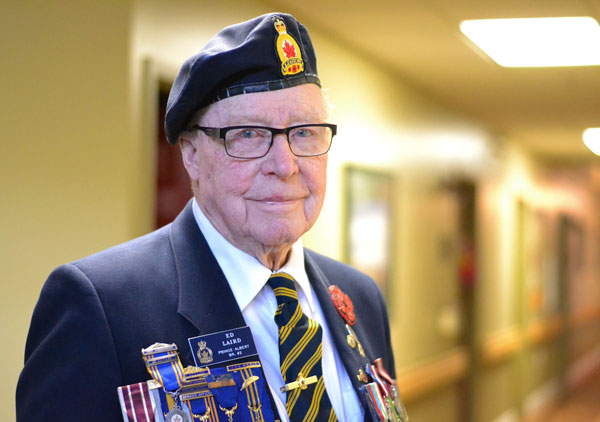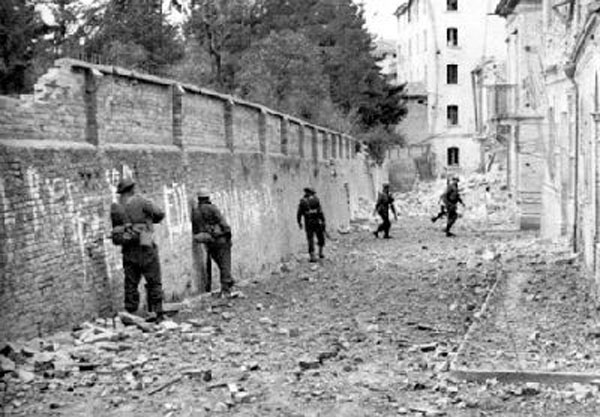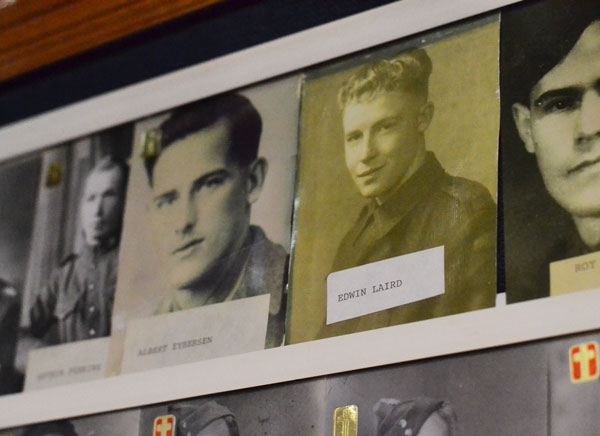
“You’re not scared until after it’s over…That’s when you start to shake.”
Prince Albert veteran Ed Laird was 21 years old during the Battle of Ortona—the now 96-year-old survived out of the 502 people killed.
The battle was part of the Italian Campaign in the Second World War. That’s where Allied Forces, which included Canadians, invaded Italy starting in July of 1943.
Just months later—from December 20 to 28—Canadian forces would attempt to capture Ortona. They succeeded despite 2,300 casualties.
“You’re not scared until after it’s over,” said Laird about the war, for most of which he was a signalman. He says he’s lucky to be alive to tell people about it.
Laird first spoke about ‘The Gully’ during the Battle of Ortona, which German forces dug in attempt to protect them from fire.
They eventually made it across. But Laird said the group of young men stayed in the frigidly cold weather for at least 10 days without shelter.
“We went house to house fighting, terrible,” he said. “There was some real bad fighting there…Bad, long days.”
The tactic of going house to house was called mouseholing. This wasn’t something Canadians were taught, but rather made up because wandering the streets was too deadly.
Soldiers would make a hole with explosives between two buildings, throwing grenades through the hole to Germans on the other side. The buildings would sometimes collapse.
“Some of these buildings, you’d throw a hand grenade in there ahead of you.”

“We were there Christmas day. It was hard to believe, but the enemy on our side called a truce for about five hours during Christmas day,” explained Laird. The Christmas of ’43 was a peaceful one during those hours of no fire.
His most memorable moment from the Battle of Ortona continues to stick with him today.
“When it’s all happening, you’re so busy and excited and everything’s going on so much that you’re strong and you’ve got your mind with you until it’s over. That’s when you start to shake,” he said.
“I was sitting behind a big brick wall there. It had quieted down and I was shaking so bad. I remember he was a military padre, in fact he could see that I was nervous and shaking and I couldn’t talk decent. He came and put his hand on my shoulder and said ‘Don’t be afraid my boy, you’re never alone. God is always with you.’ And I remember that, funny I just kind of straightened my head out and I’ve often thought of that ever since. ‘You’re never alone. God’s always with you.’”
There are more details to that encounter that Laird’s son, Tom, was able to fill in.
“The priest says ‘Ed, you don’t ever have to worry about being alone if you believe in God. And dad says ‘I don’t know what I believe in.’ He said ‘Hey, you’ll be okay, you’ll be okay.’ And so he starts to calm down a little bit and right out of the blue he says ‘I promise I’ll be a good guy. I promise I’ll be a good guy, just get me home,’” explained Tom.
“He doesn’t go home for another two and a half years.”
Thinking about Remembrance Day
On the way to the next battle in Monte Cassino, Tom said a German plane flew over and attacked 13 soldiers—Laird was one of only three who survived.
“About eight hours later after it was over, his commander says…you need to go back and bury your buddies, and you bury them in shallow graves, take their dog tags off,” he said.
“Not only did you lose your buddy, he’s blown apart. And you’ve got to bury him. Tremendous trauma with that.”

And the trauma lingered when Laird left the military just before he turned 25 years old.
“I get nervous. I was in the hospital three times. They didn’t know how to treat it, they called it post traumatic stress,” said Laird.
“At night, he would get these tremors and we’d have to give him medication just to calm him down,” added Tom.
He returned to Prince Albert with no work experience or a driver’s license. Eventually, he’d sweep the floors for a local case dealer for $70 a month and then become a mechanic.
“Last night we started talking about Ortona and my brother and I happened to go over to Ortona about 10 years ago to go over to where he’d fought,” said Tom.
“It triggers stuff you don’t even know you forgot,” he added.
He recalled his dad saying the soldiers would be “eating maggots, dirt soup” because there was no food. Tom said his dad and his friends had to remind themselves that the enemies were normal people just like them.
“It took a hell of a toll, but it also fortified him to be the great guy he is today,” said Tom.
“Ed Laird is loved by everybody.”
Laird said he was shot three times during the war, all of which occurred in the Italy invasion. One hit him on his left foot, the other on his right hip, and the last showing itself as a faint scar on his face.
The bullet cracked the bone underneath his left eyebrow, which forced him to recover in a tent behind the lines for about four days.
“I’m glad I was able to go out and tell people about it,” he said.
“I was lucky.”

